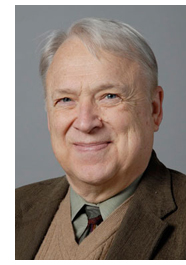Minister of science
Theodore Peters brings a theological lens to biotechnological research.
By Amy Cavanaugh
Photography courtesy Pacific Lutheran Theological Seminary
 When Theodore Peters, AM’70, PhD’73, returned to campus in October to accept the Divinity School’s 2011 Alumnus of the Year award, he gave a lecture that focused on the interaction between science and religion. As a theologian, Peters bridges the two fields by offering ethical advice to scientists working with embryonic stem cells and other forms of biotechnology.
When Theodore Peters, AM’70, PhD’73, returned to campus in October to accept the Divinity School’s 2011 Alumnus of the Year award, he gave a lecture that focused on the interaction between science and religion. As a theologian, Peters bridges the two fields by offering ethical advice to scientists working with embryonic stem cells and other forms of biotechnology.
A professor at Pacific Lutheran Theological Seminary and the Graduate Theological Union in Berkeley, California, he tries “to persuade scientists to see the religious and ethical dimensions of their research.” The “moral stance of the scientist,” a personal response to one’s research, says Peters, is not built into the practice of science. “You don’t see it in the Petri dish.”
Biotechnological advancements such as genetic engineering to improve health and enhance humankind, says Peters, are not automatically good or bad. Instead, he calls them ethically “ambiguous,” a term he inherited from Div School professor Langdon Brown Gilkey, who taught Peters “the importance of viewing science as a major influence on culture.”
In his lecture he addressed biotechnology critics’ argument that stem-cell therapies, for instance, would have the power to make human beings more God-like, enhancing “the image of God in us.” Peters concluded that the answer is no. “Advancement in technology is not simply a good thing,” he says. “It won’t be an unambiguous good because there will be forces and interests who are going to want to use it for destructive purposes.” Ultimately, he said, no amount of biotechnology or intelligence “can liberate us from sin.”
An ordained pastor in the Evangelical Lutheran Church of America, Peters admits that “some scientists run away when they see the theologian coming.” But he finds his specific religious beliefs give him insight into the ethics of scientific practice: Lutheran ethics, he says, “begins with a passage in Galatians 5:6, where St. Paul says that the Christian has ‘faith active in love.’” Faith is the response to God’s grace, he explains, and love is the next response. “Supporting science and the advance of technology is actually a form of expressing love in a social sphere.”
Peters first began to work directly with scientists on ethical issues in 1980, when his colleague Robert Russell founded the Graduate Theological Union’s Center for Theology and the Natural Sciences. (The center publishes the quarterly journal Theology and Science, which Peters cofounded with Russell nearly ten years ago and continues to edit.) Before then, Peters would “merely interpret the influence of science on culture.” With the founding of the center, says Peters, it added another element to his job: “I would engage scientists while pursuing their craft,” while they were “trying to understand reality.”
From 1998 to 2002, Peters served on the Ethics Advisory Board of the Geron Corporation, which funded the first isolation of human embryonic stem cells. Genetic researchers “welcome ethical deliberation on matters having to do with fundamental understandings of human health, patient rights, protecting tissue donors, and confidentiality.” But ethicists aren’t always welcome when big financial decisions are involved. “Big science demands big money,” Peters says, so he has been pushed away when questions of economic access to therapies arise.
He has many opponents to his views on the ethics of biotechnology. Other pastors and many Protestants and Roman Catholics disagree with him, although, he points out, his “position on supporting stem-cell research is roundly supported by both Muslim and Jewish bioethicists.” A concern for many against stem-cell research is the belief that embryos created solely for the purpose of research are still living beings, at an early developmental stage.
Peters, however, wants “the church to wake up and take seriously what science has to contribute.” Progress in stem-cell research, he says, “could lead to relief from suffering for hundreds of millions, if not eventually billions, of people. With this potential, it would be immoral to shut it down.”
Peters’s 2008 book, Sacred Cells: Why Christians Should Support Stem Cell Research (Rowman & Littlefield), includes a chapter on Chicago professor Leon Kass, SB’58, MD’62, former chair of President Bush’s Council on Bioethics, who opposes stem-cell research. In his 2002 book Life, Liberty, and Defense of Dignity: The Challenge for Bioethics (Encounter Books), Kass wonders whether biotechnology would make us “posthuman,” degrading our humanity and making our bodies into “mere instruments of our autonomous rational will.”
Peters argues that, instead of being unnatural, biotechnology is an extension of human innovation. “A human being is naturally creative,” says Peters, “and technology is one of the ways in which we’re naturally creative.”
For the past three years, Peters has been studying the ethics of another form of technological innovation: space exploration, a new field that he calls “astroethics.” With the introduction of private space exploration with financial motives, says Peters, “we need some general principles to guide space research.” He contemplates questions such as how to “protect Earth from contamination, should future astronauts bring extraterrestrial life samples back home” or whether humans should “protect the ecology of other planets.” He’s been working with astrobiologists at NASA and SETI, the Search for Extraterrestrial Intelligence, to formulate ethics and public policy for space exploration.
The thread tying together Peters’s research, whether on stem-cell research or on space travel, is what he refers to as “beneficence.” Despite the long and expensive road, and the potential for misuse, he asks, should scientists still do such research? “If you have an opportunity to make life better, you’re morally obligated to pursue it.”
